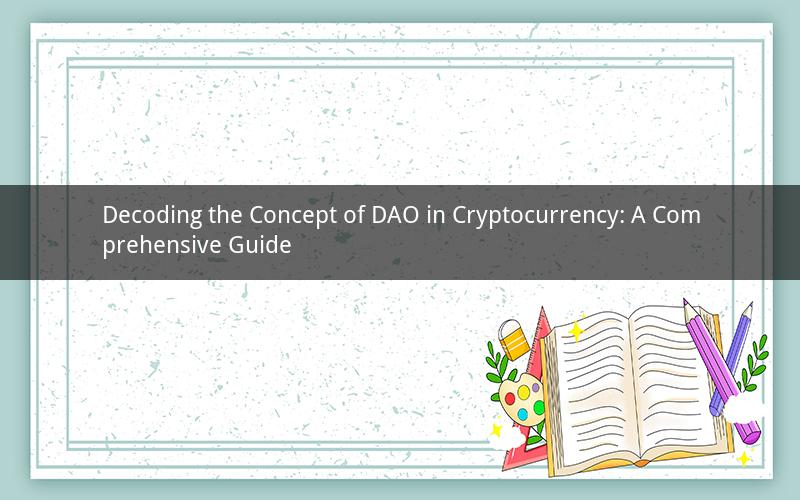
Introduction:
In the rapidly evolving world of cryptocurrency, the term "DAO" has gained significant attention. But what exactly is a DAO, and how does it function within the crypto ecosystem? This article delves into the intricacies of DAOs, exploring their definition, structure, benefits, and challenges.
What is a DAO?
A Decentralized Autonomous Organization (DAO) is a blockchain-based entity that operates without a central authority. It is a digital organization governed by smart contracts, which are self-executing contracts with the terms of the agreement directly written into lines of code. DAOs aim to provide a transparent, democratic, and equitable way of managing collective assets and decision-making processes.
Structure of a DAO:
The structure of a DAO is designed to be decentralized, ensuring that power is distributed among its members. Here's a breakdown of its key components:
1. Members: DAO members are individuals or entities that have a stake in the organization. They can participate in decision-making processes and vote on proposals.
2. Tokens: DAOs use tokens as a means of governance and as a form of ownership. These tokens represent a share of the DAO's assets and are used to vote on proposals and receive rewards.
3. Smart Contracts: These are self-executing contracts with the terms of the agreement directly written into lines of code. They are responsible for automating the execution of agreements and ensuring compliance with the DAO's rules.
4. Proposal System: DAOs use a proposal system to allow members to submit ideas and initiatives. These proposals are then voted on by the token holders, and the winning proposals are executed automatically by the smart contracts.
Benefits of DAOs:
DAOs offer several advantages over traditional organizations, including:
1. Transparency: Since all transactions and decisions are recorded on the blockchain, DAOs are highly transparent. This helps to build trust among members and stakeholders.
2. Decentralization: By eliminating a central authority, DAOs can operate without the risk of manipulation or control by a single entity.
3. Community-driven: DAOs empower their members to participate in decision-making processes, fostering a sense of ownership and commitment.
4. Cost-effective: DAOs can reduce costs associated with traditional management structures, such as salaries and administrative expenses.
Challenges of DAOs:
Despite their numerous benefits, DAOs also face several challenges:
1. Security Risks: As with any blockchain-based system, DAOs are susceptible to security threats, such as smart contract vulnerabilities and 51% attacks.
2. Regulatory Uncertainty: The legal status of DAOs varies by jurisdiction, making it challenging for organizations to operate without facing regulatory hurdles.
3. Scalability: As DAOs grow, they may face scalability issues, which can impact the speed and efficiency of their operations.
4. Decision-making Complexity: With a decentralized structure, decision-making can become complex and time-consuming, as proposals require consensus among members.
Case Studies:
To better understand the practical implications of DAOs, let's look at a few notable examples:
1. The DAO: One of the most famous DAOs is The DAO, a decentralized autonomous organization launched in 2016. However, it was hacked and lost a significant amount of funds, highlighting the security risks associated with DAOs.
2. MakerDAO: MakerDAO is a decentralized lending platform built on the Ethereum blockchain. It uses Dai, a stablecoin, to facilitate lending and borrowing. MakerDAO operates as a DAO, allowing members to vote on critical decisions affecting the platform.
3. Aragon: Aragon is a platform for creating and managing DAOs. It provides the necessary tools and infrastructure for organizations to operate as DAOs, making it easier to implement and manage decentralized governance.
Frequently Asked Questions:
1. What is the difference between a DAO and a traditional corporation?
A DAO operates without a central authority, relying on smart contracts and token-based governance. In contrast, a traditional corporation has a central leadership structure, with decision-making power concentrated in the hands of executives and shareholders.
2. Can a DAO be used for any type of organization?
Yes, a DAO can be used for various types of organizations, including non-profits, cooperatives, and businesses. Its decentralized nature makes it suitable for any entity seeking transparency, community-driven governance, and cost-effective operations.
3. How can a DAO ensure that its members are genuine and not fraudulent?
DAOs can implement various measures to verify the identity of their members, such as using blockchain-based identity verification systems and requiring a minimum token holding to participate in governance.
4. What are the risks associated with investing in a DAO?
Investing in a DAO carries risks, including security vulnerabilities, regulatory uncertainty, and the potential for fraudulent activities. It is crucial to conduct thorough research and due diligence before investing in a DAO.
5. Can DAOs be used to replace traditional legal systems?
While DAOs can provide a transparent and democratic alternative to traditional legal systems, they are not designed to replace them entirely. DAOs can complement existing legal frameworks by providing a decentralized and transparent means of governance and dispute resolution.